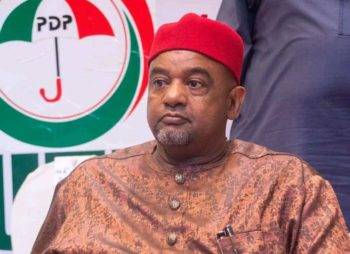Tensions within the People’s Democratic Party (PDP) have reached a boiling point as a group of sixty lawmakers has signaled their potential departure from the party unless significant changes are made at the leadership level. Led by Hon. Ikenga Ugochinyere, a representative from Imo State, and five other legislators, the group aired their grievances during a press conference held at the National Assembly complex in Abuja on Monday. Their primary demand revolves around the removal of the acting national chairman, Umar Damagum, citing concerns over the party’s direction and integrity.
The lawmakers voiced their apprehension over what they perceive as attempts to infiltrate the PDP with members sympathetic to the All Progressives Congress (APC). Hon. Ugochinyere emphasized the urgency of the situation, warning against allowing APC influence to dictate the PDP’s internal affairs. The looming threat of defection underscores the deep-seated dissatisfaction among party members, signaling a potential fracture within the PDP if their grievances remain unaddressed.
Calls for Leadership Accountability
At the heart of the lawmakers’ discontent lies the perceived lack of accountability and transparency within the PDP leadership. The demand for the removal of Acting National Chairman Umar Damagum reflects broader concerns regarding the party’s governance structure. The legislators argue that allowing Damagum to retain his position would only exacerbate existing rifts and compromise the PDP’s integrity.
Moreover, the lawmakers condemned what they view as attempts by external forces to dictate the PDP’s internal affairs. They highlighted instances of alleged imposition of APC-aligned officials in key party positions, particularly in states like Rivers and others, further fueling suspicions of a larger agenda at play. By calling for Damagum’s dismissal ahead of the rescheduled National Executive Council (NEC) meeting, the dissenting lawmakers aim to reclaim control over the party’s trajectory and ensure its autonomy from external influences.
Uncertain Future for PDP
As the PDP grapples with internal discord and the specter of potential defections, the party faces a critical juncture that could shape its future trajectory. The ultimatum issued by sixty lawmakers underscores the urgency of addressing longstanding grievances and restoring confidence in the party’s leadership. Failure to heed these demands risks further polarization within the PDP ranks and could precipitate a mass exodus, dealing a significant blow to the party’s cohesion and electoral prospects.
The upcoming NEC meeting looms large as a pivotal moment for the PDP, offering an opportunity to recalibrate its leadership and reaffirm its commitment to internal democracy. However, navigating the current crisis will require adept leadership and a concerted effort to bridge internal divisions. The outcome of this internal power struggle will not only determine the PDP’s immediate future but could also have far-reaching implications for Nigeria’s political landscape as a whole.
Political Turmoil Threatens Nigeria’s Democratic Stability as PDP Faces Internal Strife
The People’s Democratic Party (PDP) in Nigeria finds itself embroiled in a tumultuous period as internal conflicts threaten to destabilize the party’s unity. Recent developments indicate that major stakeholders and chieftains within the party are prioritizing personal political ambitions over the collective strength of the party. This self-serving pursuit of power has led to a fractured leadership, with divergent factions vying for control. The failure of key members to recognize the importance of a united front has exacerbated the situation, leading to a hemorrhaging of party members and support.
The ramifications of this internal strife are significant, particularly as Nigeria approaches the 2027 elections. With each passing day, the PDP risks further alienating its base and losing the trust of the electorate. A weakened opposition not only undermines the democratic process but also erodes the checks and balances essential for a functioning democracy. As the primary opposition party in Nigeria, the PDP plays a crucial role in holding the ruling party accountable and ensuring a fair and transparent electoral system. However, unless immediate measures are taken to address the internal divisions and foster party cohesion, the PDP may find itself marginalized in the political landscape, diminishing the prospects for a vibrant and robust democracy in the country.
Implications for Nigeria’s Democratic Future
The escalating crisis within the PDP poses a significant threat to the democratic principles upon which Nigeria’s governance system is built. Democracy thrives on the existence of a strong and effective opposition, capable of providing alternative policies, scrutinizing government actions, and representing the diverse interests of the populace. However, the current state of disarray within the PDP jeopardizes these fundamental principles, leaving the ruling party unchecked and undermining the democratic process.
Furthermore, the erosion of trust in political institutions and the disillusionment of citizens with the political elite could have far-reaching consequences for Nigeria’s stability and development. A lack of faith in the electoral system may lead to voter apathy and disenfranchisement, weakening the democratic legitimacy of future governments. Moreover, the absence of a credible opposition diminishes the prospects for meaningful political reform and progress, leaving the country vulnerable to authoritarian tendencies and governance crises.
In light of these challenges, urgent action is needed to address the internal divisions within the PDP and revitalize the party as a formidable force in Nigerian politics. This requires a concerted effort by party leaders to prioritize the common good over personal ambitions, reconcile competing interests, and rebuild trust among party members and the electorate. Only through unity and a commitment to democratic values can the PDP fulfill its role as a vital pillar of Nigeria’s democratic stability and ensure a bright future for the country.
Table of Contents
Discover more from OGM News NG
Subscribe to get the latest posts sent to your email.














